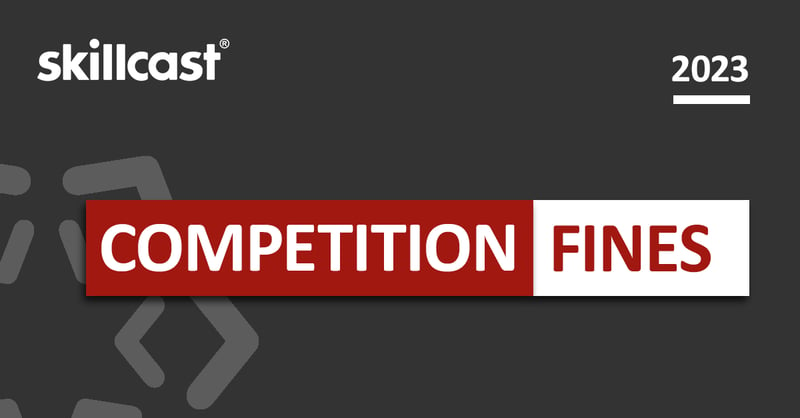There is a fine line between a healthy level of competition and anti-competitive behaviour. Crossing that line can cause significant financial and reputational damage to your company.
If you're interested in earlier penalties, see competition law fines 2020 and the highest competition fines of 2021. For the latest fines, check out the biggest competition law fines of 2023.
Biggest competition law fines in 2022
- Pfizer & Flynn - £70m - Abuse of dominant position
- Mastercard - £31.5m - Anti-competitive agreement
- Focus - £15.5m - Anti-competitive agreement
- JD Sports - £4.3m - IEO breach
- Dar Lighting - £1.5m - Resale Price Maintenance
- Facebook - £1.5m - IEO breach
Anti-competitive agreements and breaches in Initial Enforcement Orders (IEO) have been a thorn in the side of regulators this year. The UK Payment Systems Regulator (PSR) and the Competition & Markets Authority (CMA) have not held back when issuing fines. After its first cartel decision, the PSR dished out £33 million in fines.
Biggest competition law fines of 2022 in detail
1. Pfizer & Flynn - £70m fine
Following an investigation by the Competition and Markets Authority (CMA), pharmaceutical companies, Pfizer and Flynn, were found guilty of charging unfairly high prices for phenytoin sodium capsules for around four years which the NHS ultimately paid for.
The firms debranded this drug which was previously known as Epanutin so they could set prices as high as they wanted. Since Pfizer and Flynn are the dominant suppliers of the drug, the NHS had no choice but to pay these prices.
Over the four-year period, Pfizer charged between 780% and 1,600% more than what the price was previously. As a result, the NHS costs for phenytoin capsules increased from £2m in 2012 to £50m the following year. After appealing the original decision, the CMA gathered more information and found that Pfizer and Flynn abused their dominant positions. The CMA fined Pfizer and Flynn £63.3m and £6.7m respectively.
2. Mastercard - £31.5m fine
The PSR has fined Mastercard £31.5 million. Four other companies were fined alongside the financial services company, including allpay, Advanced Payment Solutions (APS), Prepaid Financial Services (PFS) and Sulion, for breaching competition law. In total, the companies were fined £33 million.
The PSR, which regulates the £81 trillion payment systems industry, found that the five companies had agreed not to compete in the prepaid cards market. Upon investigation, the PSR found that the five companies had an agreement not to target or poach one another's clients while acting as part of The National Prepaid Cards Network.
These five companies essentially formed a market sharing cartel. Furthermore, the PSR found that the companies had colluded to allocate potential public sector customer contacts. This cartel behaviour is particularly serious since it reduced competition and choice for local authorities who could have found cheaper, better-quality products.
3. Focus - £15.5m fine
The CMA has fined four pharmaceutical companies and a private equity firm over £35 million, with Focus on the receiving end of the largest fine amount. Focus'fine of £15.5 million is nearly double that of the other four companies fined, Medreich, Alliance and Lexon.
The UK's watchdog found that these pharmaceutical companies agreed to limit the supply of an anti-nausea drug, Prochlorperazine, to the National Health Service (NHS). This action caused the price of the drug to rise by 700%.
The investigation revealed that Alliance had appointed Focus as its distributor, with Lexon and Medreich earning a share of the profits in return for agreeing not to compete in the supply of this drug.
The CEO of the CMA stated that "these firms conspired to stifle competition in the supply of this important medication so that the NHS – the main buyer of the drugs – lost the opportunity for increased choice and lower prices."
4. JD Sports - £4.3m fine
After the CMA blocked the £90 million merger between JD Sports and Footasylum due to competition concerns, JD Sports was fined £4.3 million due to breaching the Initial Enforcement Order (IEO). Footasylum was also fined a lesser amount of £400 thousand.
The IEO breach is related to the reporting and prevention of 'commercially sensitive information' (CSI) disclosure. Furthermore, the companies failed to have proper safeguards in place to notify the CMA. In response to the fines, JD Sports that it had "always acted honestly and in good faith" to comply with the IEO.
5. Dar Lighting - £1.5m fine
The CMA fined the domestic light supplier, Dar Lighting £1.5m for placing restrictions on discounts that retailers could offer customers online. Customers have the option to compare prices and shop around for the best deal, and competition between retailers thrives when these retailers have the freedom to price independently.
The CMA found that Dar Lighting restricted resellers from offering discounts beyond a certain level from 2017 to 2019. Before the investigation, the CMA issued two warning letters to the company. However, they continued to restrict discounts. As a result, the CMA increased their fine by 35%.
6. Facebook - £1.5m fine
Following the CMA's decision to fine Facebook (now known as Meta) £50.5 million for repeated failures to comply with the terms of an IEO, they have been fined another £1.5 million for breaches of the same IEO.
The reason being the company had failed to disclose any material business changes to the CMA. This failure includes not informing the CMA of the resignation and departure of key staff when Meta was obligated to do so. Furthermore, the company failed to meet its obligation to seek the CMA's written consent before such departures and subsequent rehiring.
What can we learn from these fines?
- Refrain from acting to restrict competition in markets where you enjoy a dominant position, such as refusing to supply or limiting the supply of a product.
- Any company subject to an investigation must be fully aware of its obligations and diligent in carrying them out.
- Never discuss or enter into agreements with competitors regarding prices, margins, market shares or production volumes.
- Don't exchange commercially sensitive information with another company without CMA consent, even if the intention is to merge with that company.
Want to learn more about competition compliance?
We have created a series of comprehensive roadmaps to help you navigate the compliance landscape, supported by several financial crime prevention courses in our Essentials Library.
We also have 100+ free compliance training aids, including assessments, best practice guides, checklists, desk aids, eBooks, games, posters, training presentations and even e-learning modules!
Finally, the SkillcastConnect community provides a unique opportunity to network with other compliance professionals in a vendor-free environment, priority access to our free online learning portal and other exclusive benefits.











